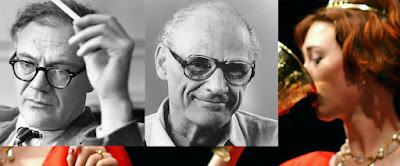On poetry, TS Eliot explains understanding evolves from the physical effectiveness of any given poem, how it works on his senses, his emotions. It is from this point, as one gathers or weighs the components of a piece, the work of intellect starts. And it is a relief to be reading Eliot again, a confirmation, spelling out what he instinctively knows makes a poem.
His discussion of plays shines less. Putting the play as a whole over any particular
character Eliot makes the refreshing case that Hamlet is a failure. Enjoyment of the play might trump this view,
but I accept his conclusion that with Hamlet, frustrated in matching his own intense
feelings to his mother’s passive self, Shakespeare tackled a problem which
proved too much for him. The whole how
or why of it we can never know… we assume it to be an experience which exceeded
the facts. To know why Hamlet was made to tackle problems beyond him we should
have to understand things which Shakespeare did not understand himself.
Less than madness, more than feigned: with adolescence and psychology turned over and dismissed: the levity of Hamlet, his repetition of phrase, his puns, are not part of a deliberate plan to dissimulation, but a form of emotional relief. In the character it is the buffoonery of an emotion which can find no outlet in action: in the dramatist it is the buffoonery of an emotion which he cannot express in art. And as every wit is strained to align the world with his own experience, Hamlet indeed seems Eliot’s artist, who intensifies the world to his emotions.
Isn’t it in
that that the prince precisely is, or proves again to be, the mirror of the
age? Eliot is right to point out Hamlet
is not so young as to unable to keep his emotions unchecked, so disturbed as to
have his ghosts and uncertainties separate him entirely from that upset world
where the play begins.
And I remember there is that renaissance marque of Hamlet and Yorick’s
skull, even by the Elizabethan age we still had a foot entrenched in the middle
ages, close to death in life and etc.
I am content the anguish, the separation, this unchecked indulgence and lack of conclusion in Shakespeare’s drawn-up struggle of wits - to the distress of family and court - is the play itself. It comes to mind Arthur Miller, in his autobiography Timebends, records a visit by Robert Lowell and when the poet made some pronouncement on the determined rules of a playwright, adding that as Eliot said so it, must be true. Perhaps unspoken at the time, Miller’s reaction was: I’ll be the judge of that.
.
Well, I am putting aside Augustine – more patience required – Wallace Stevens – same – Death of the Poets, by an English pair eminently sortable into type themselves – no – pleased to be back on the trail of the aesthetic and purpose of the poet.
From Tradition and the Individual Talent
“…There are
many people who appreciate the expression of sincere emotion in verse, and
there is a smaller number of people who can appreciate technical excellence.
But very few know when there is an expression of significant emotion, emotion which has its life in the poem and not
in the history of the poet. The emotion
of art is impersonal. And the poet cannot reach this impersonality without
surrendering himself wholly to the work to be done. And he is not likely to know what is to be
done unless he lives in what is not merely the present, but the present moment
of the past, unless he is conscious, not of what is dead, but of what is
already living.”

